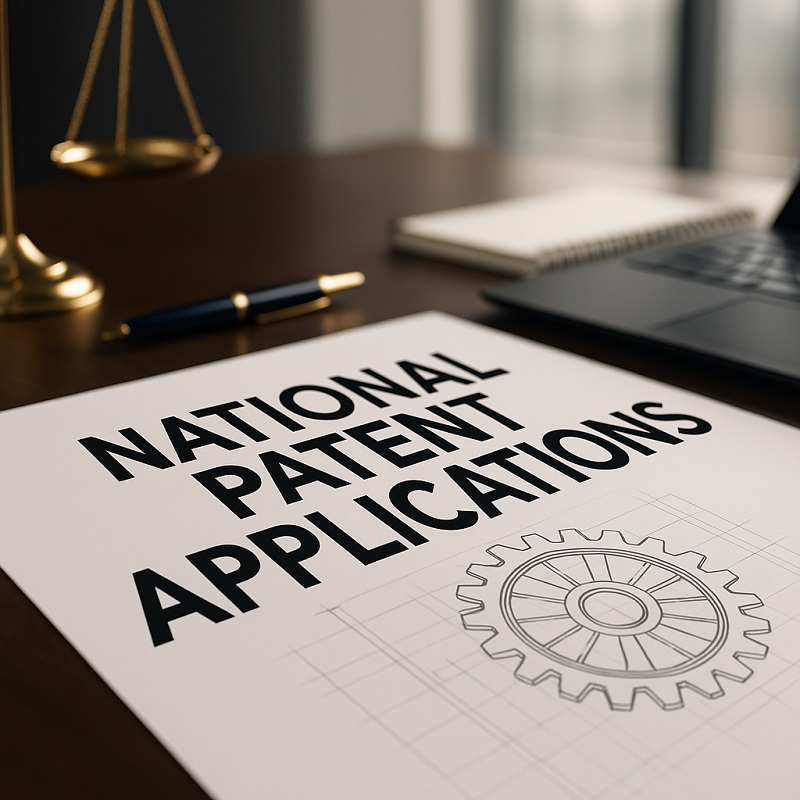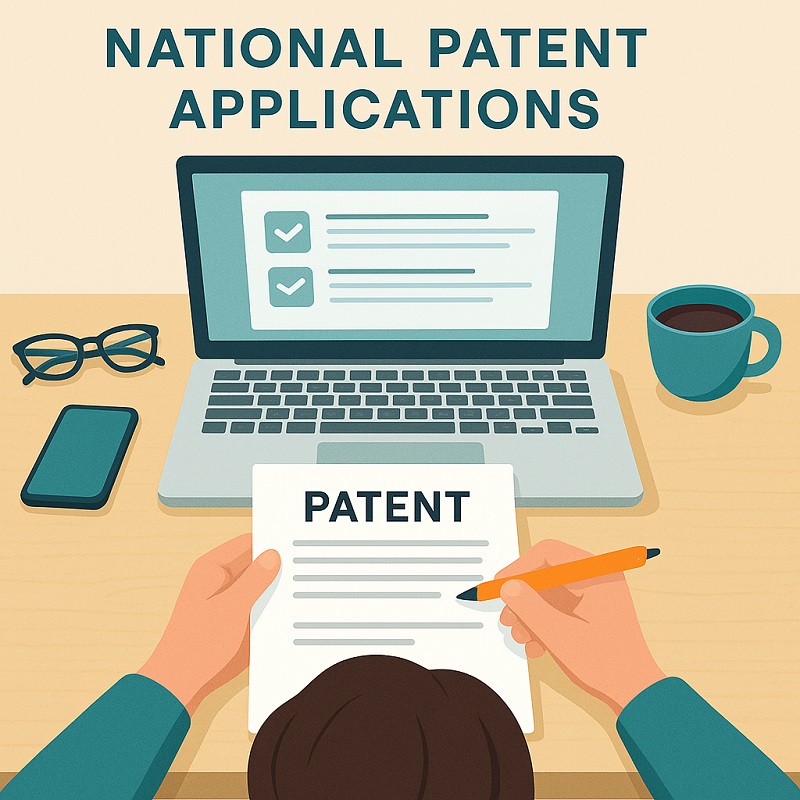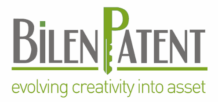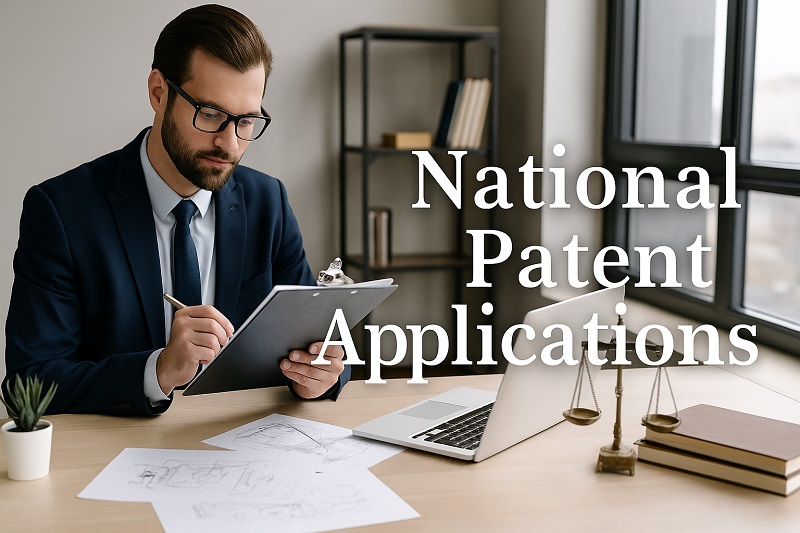In the competitive world of intellectual property, National Patent Applications are the cornerstone of local innovation strategies. For companies operating in a specific country, securing patent rights at the national level ensures that their inventions are legally protected within the jurisdiction, creating a safe and strategic foundation for growth.
National Patent Applications provide inventors with exclusive rights over their technical solutions, preventing others from manufacturing, using, selling, or importing the patented invention without authorization. In countries like Turkey, where innovation is a key driver of economic development, these applications are especially significant for protecting valuable technological advancements.
National Patent Applications: Laying the Groundwork for Innovation in Turkey
Patent systems form the foundation of technological development and sustainable competitive advantage. In Turkey, national patent applications serve as the first crucial step in securing legal protection for inventions and translating them into commercial value. Filing a patent locally not only ensures protection in the domestic market but also validates the innovation for public and private support schemes. These filings enable businesses to stand out in their sectors, attract partners and investors, and generate long-term returns from their R&D efforts. Particularly for SMEs and startups, national filings provide a strategic entry point into the IP world, increasing their credibility and market readiness.
National Patent Applications: Aligning with Global IP Strategies
While national filings secure rights within Turkey, they are often designed to fit into broader international IP portfolios. Many companies, especially those seeking regional or global expansion, use Turkish national patent applications as the cornerstone of their global IP strategy. These filings can be extended through international routes like the PCT (Patent Cooperation Treaty) or European Patent Convention (EPC). Moreover, Turkey’s strategic geographic and economic position makes national patents critical for businesses bridging Eastern and Western markets. By ensuring consistency in claim structure and technical disclosures, Turkish filings help streamline global IP coordination across multiple jurisdictions.
National Patent Applications: Navigating Legal and Procedural Specifics
National filings in Turkey must comply with the specific regulations and timelines set by the Turkish Patent and Trademark Office (TÜRKPATENT). The process includes formal examination, publication, search and examination reports, and grant decisions. It is essential to draft strong claims, accurate technical descriptions, and clear drawings that withstand scrutiny. Applicants also benefit from understanding opposition timelines and annuity fee structures. Legal expertise is especially important in navigating refusals, responding to office actions, and filing appeals when necessary. A thorough knowledge of procedural nuances can make the difference between success and rejection, especially in competitive technical fields.
National Patent Applications: Supporting R&D Incentives and Grants
Beyond protection, Turkish national patent filings unlock access to public incentives and funding mechanisms. Institutions such as TÜBİTAK, KOSGEB, and the Ministry of Industry often require patent filings as eligibility criteria for R&D support. Companies with patents or active applications can benefit from tax deductions, investment credits, and innovation grants. Furthermore, having a national patent filing in place increases project credibility, especially when collaborating with universities or international partners. Patents are not just defensive tools—they are critical elements of strategic growth, helping companies translate ideas into funded innovation and giving them a competitive edge in technology-driven sectors.
National Patent Applications: Ensuring Commercial Readiness
A well-prepared national patent application is instrumental in turning an invention into a market-ready product or service. The patent process itself serves as a filter for evaluating commercial viability, technical novelty, and business potential. Companies often leverage national patents when negotiating with investors, licensing partners, or distributors. The clarity and scope of claims, as well as the speed of prosecution, directly impact market entry timelines. By aligning the patent with commercialization goals from the outset, applicants can build a stronger foundation for product development, investment attraction, and IP monetization through licensing or joint ventures.
National Patent Applications: Building a Defensible IP Position
In today’s IP-centric economy, having a patent is not enough—it must also be enforceable. A well-drafted national patent application contributes significantly to building a strong, defensible position against competitors. This includes crafting claims that are both broad enough to deter infringement and specific enough to avoid invalidation. Patents also play a crucial role in litigation or licensing negotiations, offering a clear demonstration of proprietary technology and innovation. For Turkish companies, establishing a robust local IP portfolio is essential for competing in both domestic and global markets. Effective national filings serve as powerful deterrents, legal shields, and negotiation levers in commercial and legal settings alike.
The process of preparing National Patent Applications begins with the drafting of clear and precise patent claims. These claims define the scope of protection and must be supported by a detailed description of the invention, along with any necessary drawings. Clarity and technical accuracy are essential in National Patent Applications, as vague or overly broad claims can lead to rejection or weak enforceability.
Working with registered patent attorneys or experienced consultants is highly recommended when drafting National Patent Applications. They bring technical knowledge, legal understanding, and procedural expertise, which together ensure that the application meets all formal and substantive requirements set by the national patent office.
In Turkey, National Patent Applications are administered by TÜRKPATENT (Turkish Patent and Trademark Office). The process includes formal examination, publication, and in some cases, substantive examination depending on the type of application (patent or utility model). While patents undergo detailed technical scrutiny, utility models offer a faster route to protection with a more limited scope.
One of the key advantages of National Patent Applications is their role in strengthening local market presence. By securing patents within a specific country, businesses can block competitors from entering the same market with similar technologies. This protection fosters exclusive commercialization rights and contributes to market leadership.
Additionally, National Patent Applications serve as a foundation for future international filings. Under the Paris Convention, applicants can claim priority from a national application when filing in other jurisdictions within 12 months. This strategy enables phased expansion, where businesses can test local markets before investing in broader international protection.
Startups and SMEs particularly benefit from National Patent Applications due to their relatively lower cost and strategic focus. Filing locally allows them to establish ownership, attract investors, and demonstrate innovation capability without the immediate expense of international filings.

Moreover, governments often offer incentives and tax advantages to encourage National Patent Applications. In Turkey, for instance, companies with registered patents may benefit from R&D tax deductions, technology development zone exemptions, and increased eligibility for public grants.
The commercialization of patents begins with strong National Patent Applications. Investors and partners look for legally sound, enforceable IP assets when evaluating innovation potential. An accurately drafted and approved national patent adds credibility and negotiation power to licensing and technology transfer agreements.
From a legal standpoint, National Patent Applications also provide the basis for litigation and enforcement. Once a patent is granted, the holder can initiate legal actions against infringers in local courts, request customs seizures of counterfeit goods, or file criminal complaints where applicable. These enforcement measures rely on the strength of the original National Patent Applications and their compliance with national IP law.
It is essential to monitor deadlines associated with National Patent Applications, including filing dates, publication, examination responses, and renewals. Missing these deadlines can result in loss of rights or added administrative burden. Many firms choose to work with IP consultants to manage their patent portfolios effectively and avoid costly errors.
Digital tools and online filing systems have modernized the submission of National Patent Applications. Most national patent offices, including TÜRKPATENT, now offer e-filing portals, allowing applicants to submit documents, monitor progress, and communicate with examiners efficiently. This streamlining has reduced procedural barriers and made IP protection more accessible.
For academic institutions and research centers, National Patent Applications are a key part of technology valorization. Protecting inventions before publication allows universities to retain ownership, license the technology, and participate in commercialization. Many technology transfer offices (TTOs) coordinate National Patent Applications as a central part of their operations.
Similarly, multinational corporations use National Patent Applications to localize their global IP strategies. By aligning core inventions with local markets, they secure exclusive rights while complying with country-specific regulations. This localization through National Patent Applications adds resilience and adaptability to the overall IP portfolio.

The drafting language in National Patent Applications must be tailored to the legal and cultural nuances of the jurisdiction. In Turkey, this means providing Turkish-language submissions with clear technical terminology that aligns with national standards. Inaccurate translations or inconsistent terminology can jeopardize the entire application.
Education and awareness around National Patent Applications are growing. Many professional organizations, chambers of commerce, and public agencies now offer training and resources to support inventors and companies in filing strong applications. This ecosystem development is crucial for fostering innovation and building a robust IP culture.
Bilen Patent plays an active role in supporting clients with their National Patent Applications. Our multidisciplinary team, composed of patent engineers, attorneys, and industry consultants, works closely with clients to draft, file, and prosecute applications tailored to their technical and commercial needs. From start-ups to large corporations, we help innovators transform ideas into protected assets.
We assist clients in conducting prior art searches, assessing patentability, drafting claims, preparing technical documents, and responding to office actions. Our experience spans across various industries including automotive, pharmaceuticals, software, and manufacturing, allowing us to offer sector-specific strategies for National Patent Applications.
In recent years, the number of National Patent Applications has steadily increased, reflecting the growing importance of local IP protection. Companies now recognize that safeguarding their inventions within key jurisdictions is essential for sustaining competitive advantage and fostering innovation.
Sustainability and environmental innovation have also entered the landscape of National Patent Applications. Green technologies, eco-efficient processes, and energy-saving products are now at the forefront of IP filings. Governments and patent offices have responded by streamlining procedures and offering fast-track options for environmentally impactful inventions.
For entrepreneurs, filing National Patent Applications signals professionalism and readiness. It shows that an idea is not just innovative but also protected, planned, and positioned for commercialization. This perception is critical when pitching to investors, applying for grants, or entering public-private partnerships.
Moreover, National Patent Applications foster collaboration. Joint R&D projects often begin with patent strategy discussions, ensuring that ownership and benefits are clearly defined. Shared filings between partners, co-applicants, or consortiums enhance transparency and reduce conflicts.
Looking ahead, artificial intelligence (AI) and automation will further transform National Patent Applications. AI-assisted drafting tools, automated classification systems, and machine learning-based prior art analysis are becoming part of modern IP workflows. These technologies will improve accuracy, speed, and accessibility of the patent filing process.
To conclude, National Patent Applications are not only legal necessities but strategic assets that unlock value, drive innovation, and secure market position. Whether you’re protecting a breakthrough invention or reinforcing an existing portfolio, investing in well-prepared National Patent Applications is essential for long-term success.
At Bilen Patent, we are committed to supporting clients at every step of the journey. Contact our team today to ensure your innovations receive the protection they deserve.

